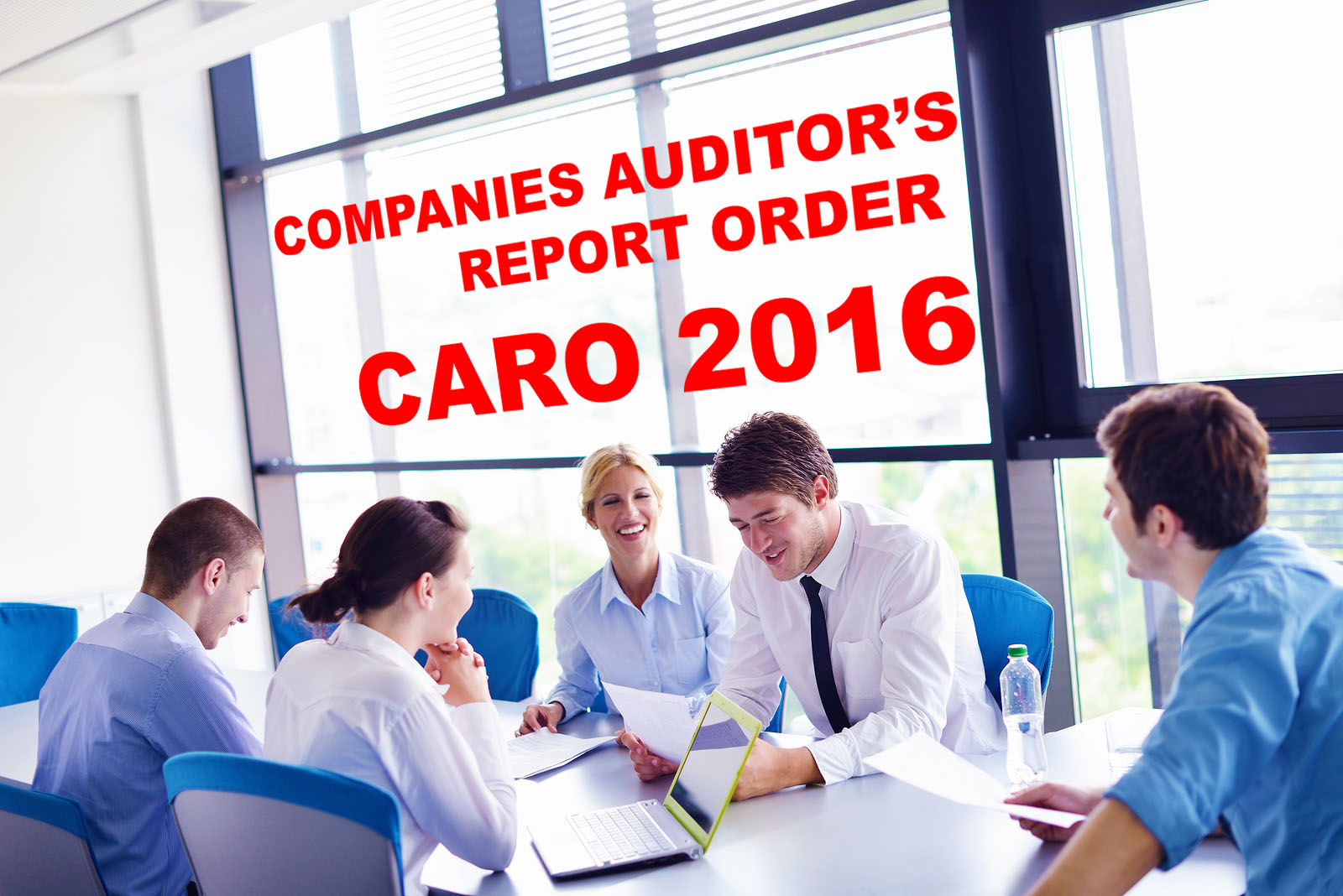THE COMPANIES AUDITOR’S REPORT ORDER-CARO 2016
Sec 143(11) of the Companies Act, 2003 requires that the auditor’s report of specified companies should include a statement on the prescribed matters. These reporting requirements have been prescribed under the Companies(Auditor’s Report) Order, 2016.
APPLICABILITY
It shall apply to every company including a foreign company as defined in clause (42) of section 2 of the Companies Act, 2013 (18 of 2013) [hereinafter referred to as the Companies Act], except–
• a banking company as per the clause (c) of section 5 of the Banking Regulation Act, 1949 (10 of 1949);
• an insurance company as per the Insurance Act,1938 (4 of 1938);
• a company licensed to operate under section 8 of the Companies Act;
• a One Person Company as per the clause (62) of section 2 of the Companies Act and a small company as defined under clause (85) of section 2 of the Companies Act; and
• a private limited company, not being a subsidiary or holding company of a public company, having a paid up capital and reserves and surplus not more than rupees one crore as on the balance sheet date and which does not have total borrowings exceeding rupees one crore from any bank or financial institution at any point of time during the financial year and which does not have a total revenue as disclosed in Schedule III to the Companies Act, 2013 (including revenue from discontinuing operations) exceeding rupees ten crore during the financial year as per the financial statements.
However this order does not applies to Consolidated Financial Statement.
MATTERS THAT ARE REQUIRED TO BE INCLUDED IN THE AUDITOR’S REPORT
Audit Report to whichthis clause apply must contain the following:
Fixed Assets, Clause 3(i)
• Proper Records: Whether the company is maintaining proper records, including quantitative details and situation of the fixed assets.
• Physical Verification: Whether such assets have been physically verified by the management at reasonable intervals. Such intervals may vary from asset to asset. Whether any discrepancies came into the notice on the verification, if so whether the same have properly dealt with in the books of the accounts.
• Title Deeds: Whether the title deeds of the immovable property is in the name of the company. If not, provide the details, thereof;
Inventory, Clause 3(ii)
• Whether physical verification of the inventory has been made at regular intervals by the management, and during such verification if any material discrepancies were noticed whether the same have been properly accounted for.
Loan given by the company, Clause 3(iii):
Whether the company has granted any loans(secured or unsecured) to companies, firms, Limited Liability Partnership(LLP) or other parties covered under the sec 189 of the Companies Act. 2013.
• Whether the terms and conditions of the grant of loans are not prejudicial to the interest of the company.
• Whether the repayments are regular and within the stipulation.
• Whether the amount that is overdue for more than 90 days has been reported and reasonable steps has been taken by the company to recover the amount.
Loans and Investments, Clause 3(iv):
In respect of loans, investments and guarantee, whether provision of sec 185 and 186 have been compiled with, and if not whether details are provided thereof.
Deposits, Clause 3(v):
In case the company has accepted any deposits, whether following points have been taken care of :
• Directives issued by the Reserve Bank of India (RBI)
• Provisions under sections 73 to 76
• Orders passed by CLB, NCLT, RBI or any other court or tribunal.
Reasons of contraventions should be stated, if any of the above is not compiled with.
Cost Records, Clause 3(vi):
Whether the Cost records under sec 148(I) of the Companies Act, 2013 have been made and maintained
Statutory Dues Clause 3(vii):
(i) Statutory Dues For More Than 6 moths:Whether the company is regular in depositing undisputed statutory dues with the appropriate authorities like Provident fund,ESI,Income Tax,Sales Tax,Service Tax,Duty of Customs,Duty of Excise,Value Added Tax, etc.If the company is not regular in depositing these Statutory dues, the extent of the arrears on the last day of the financial year concerned for the period of more than 6 months from the date they payable, shall be reported.
(ii) Disputes for taxes and duty:In case of dues of Income tax, or Sales Tax, value added tax, services tax has not been deposited on account of any dispute, than the amount involved and the nature of tax should be mentioned.
Repayment of Loans, Clause 3(viii):
Whether the company has defaulted in repayment of loans or borrowings to financial institutions, banks, or to Government or debenture holder, if so the amount should be reported along with lender wide details.
Utilization of IPO and other Public Offer, Clause 3(ix):
Whether money raised by the company through IPO or other public offer(including debt) were applied for the purpose they were raised, if not details altogether with the default should be stated.
Stating Of Fraud, Clause 3(x):
Whether any fraud by the company or any fraud on the company by its officers or employees have been noticed during the financial year,. If yes amount and nature of such fraud should be stated.
Approval of Managerial Remuneration, Clause 3(xi):
Whether managerial remuneration has been paid or provided in accordance with the requisite approvals as per the provisions of the section 197 of the Companies Act,2013. If not state the amount involved and steps taken by the company to secure the refund of the amount.
Nidhi Company, Clause 3(xii):
Whether the Nidhi company has complied with the Net Owned Funds to Deposits in the Ratio 1:20 to meet out the liability and whether these companies are maintaining 10 % unencumbered term deposits as specified in the NIdhi Rules,2014 to meet out the liability.
Related Party Transactions, Clause 3(xiii):
Whether all the transactions with the related parties are in compliance with section 177 and 188 of the companies act 2013 and details have been disclosed in the financial statements as required by applicable accounting standards.
Private Placement or Preferential Issues, Clause (xiv):
Whether the company has made any preferential allotment or private placement of shares or fully or partly convertible debentures during the year, if so whether the requirement of sec 42 have been complied with and amount raised has been used for the purpose for which it was raised. If not state the deviations.
Non Cash Transactions, Clause 3(xv):
Whether the company has entered into any non cash transactions with the directors or the persons connected with him if so whether they are in the compliance with the sec 192, of the Companies Act 2013. If not state the non compliance.
Register Under RBI Act 1934, Clause 3(xvi):
Whether the company is required to be registered under the sec 45-IA of the Reserve Bank of India, 1934. And if yes whether the registration has been obtained or not.


